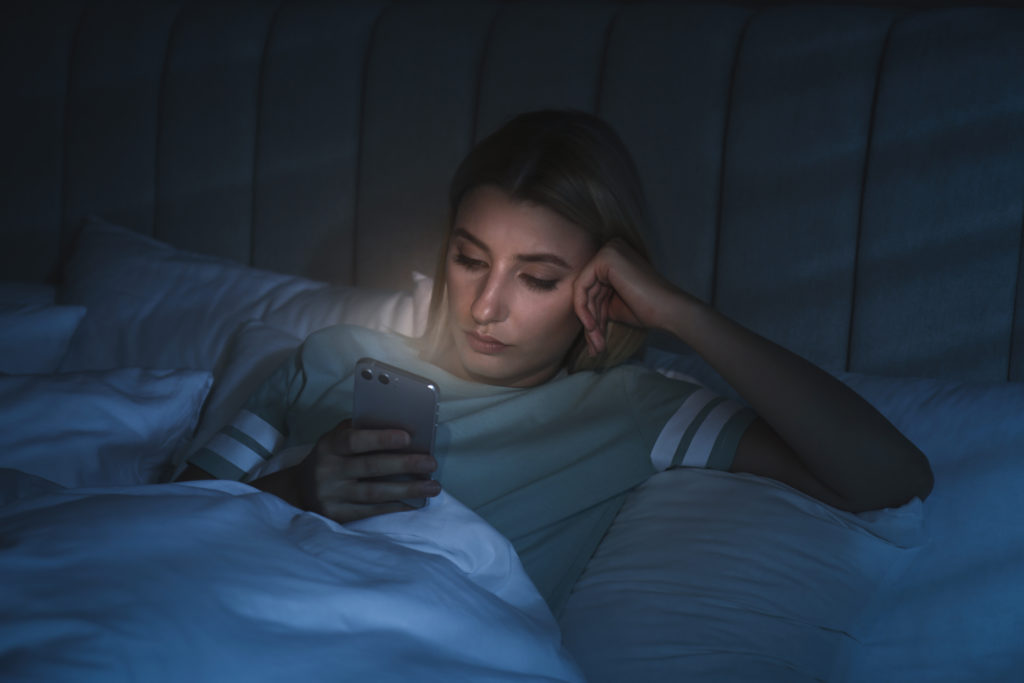By Dr. Natalie Ledbetter CRNA, DAcOM

Probably all of us can use 8 tips for better sleep! When I first started into perimenopause about 7 years ago in my mid 40’s the first symptom I experienced was severe insomnia. It was so bad that I tried Ambien for a time, even though I really don’t like to take medications. While I was on the Ambien, I did a deep dive into how to improve sleep naturally or at least without prescription meds. Here is a quick list of things I found to be helpful. It you want more information on improving your sleep, I like Dave Asbury’s books and podcasts.
8 Tips For Better Sleep
Protect yourself from blue light.
Blue light comes from the screens of our devices, streetlamps, and LED lights. Wear blue light blocking glasses after noon. Use black out curtains in your bedroom to keep light out while you sleep. Don’t keep your phone in your bedroom, or if you do, keep it on the other side of the room and in silent mode. Don’t use computers, tablets, TVs or cell phones in the 2 hours before bed.
No caffeine within 8 hours of bed.
Even if you do not feel like caffeine affects your sleep, it affects your deep sleep. Caffeine’s half-life is up to 5 hours. Half-life is the amount of time it takes for a quantity of a substance to be reduced to half the original amount, so only half the caffeine in that coffee you had at dinner is gone by 10:00pm and the rest is still hanging around messing with your deep sleep.
Meditate.
Meditation has been shown to rewire your brain , strengthening neural pathways that calm down your nervous system. We will be talking about meditation more in depth in future blog posts.
Keep a journal by your bed.
Something that can keep me up at night is the hamster brain running like crazy on the thought wheel (more like the worry wheel). As soon as I lie down, these thoughts start popping up. “Did I lock the car?” “I need to remember to- (insert 12 tasks here) tomorrow.” “Oh no, I forgot to call so-and-so today!” “I forgot to check my schedule. I wonder what it looks like?” And on and on it goes. I meditate before bed now so these thoughts are less, but when they pop up, I write them down in my notebook so I know I won’t forget and I can deal with it tomorrow. This has helped me so much because before I would worry that I would forget and then I couldn’t sleep.
Have healthy fats and proteins at dinner to keep your blood sugar stable during the night.
If you have too many simple carbs and not enough protein and fat at dinner, your insulin levels could spike and then send your blood sugar levels plummeting. If this occurs while you are sleeping, your adrenals will release cortisol to increase your blood sugar and this will bring you up out of quality sleep. Have a serving of grass fed beef, organic chicken, or wild caught fish such as salmon at dinner and a teaspoon of a healthy oil such as grass fed butter, ghee, coconut oil, or MCT oil will keep your insulin and glucose levels more steady. Vegans and vegetarians can supplement with a small plant-based protein shake and some coconut or MCT oil.
Try supplements.
The 3 M’s are a good place to start if you want to try supplements to improve your sleep. The first M is magnesium. Magnesium (Mg) has many actions in the body and benefits and there are many forms, but for sleep I recommend Mg citrate for calming effects and Mg glycinate for sleep. Follow the recommendations on the bottle. The second M is Melatonin. Some people feel sleepy the next day after Melatonin, so I recommend playing with the dose to see what works best for you. I would start at 1mg 30 to 60 minutes before bed. Magnolia bark makes up the 3rd M and is a Chinese herb used for centuries in Asian cultures. It helps produce a sense of calm, reduces racing thoughts, and can improve sleep quality. I recommend starting with a dose of around 200mg to 400mg if taking it alone. There are many other herbs and supplements that are excellent to help with stress and sleep, but they are beyond the scope of this book. For a good combination sleep supplement, I recommend Deep Sleep from BioTE.
Try a weighted blanket.
Many people say that a weighted blanket helps them feel safe and assists them in falling asleep faster. I have one and I love it in the winter. During the summer months I find it to be a little too hot.
Keep your room temperature on the cooler side at night.
Most sleep experts agree that a temperature around 65 degrees Fahrenheit is the ideal sleep temperature. Sleeping in a room that is too hot can decrease your sleep efficiency, so experiment with different temperatures close to the 65-degree range and see what is best for you.
Sleep is so important for physical and mental health. Try the 8 tips for better sleep above to help improve your sleep quality and maybe even quantity. Your mind and body will thank you.
Want more information on how sleep affects your skin? Check this out. https://lalongevity.com/goodnight-skin-tight/
Click here https://drnatalieledbetter.com/f/melatonin-for-sleep-health-and-weight-loss for information on melatonin and sleep.
